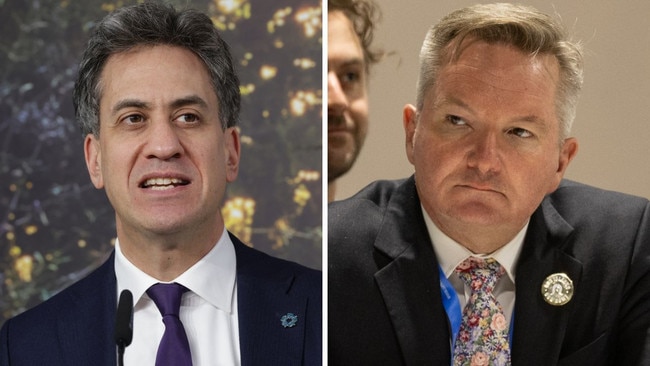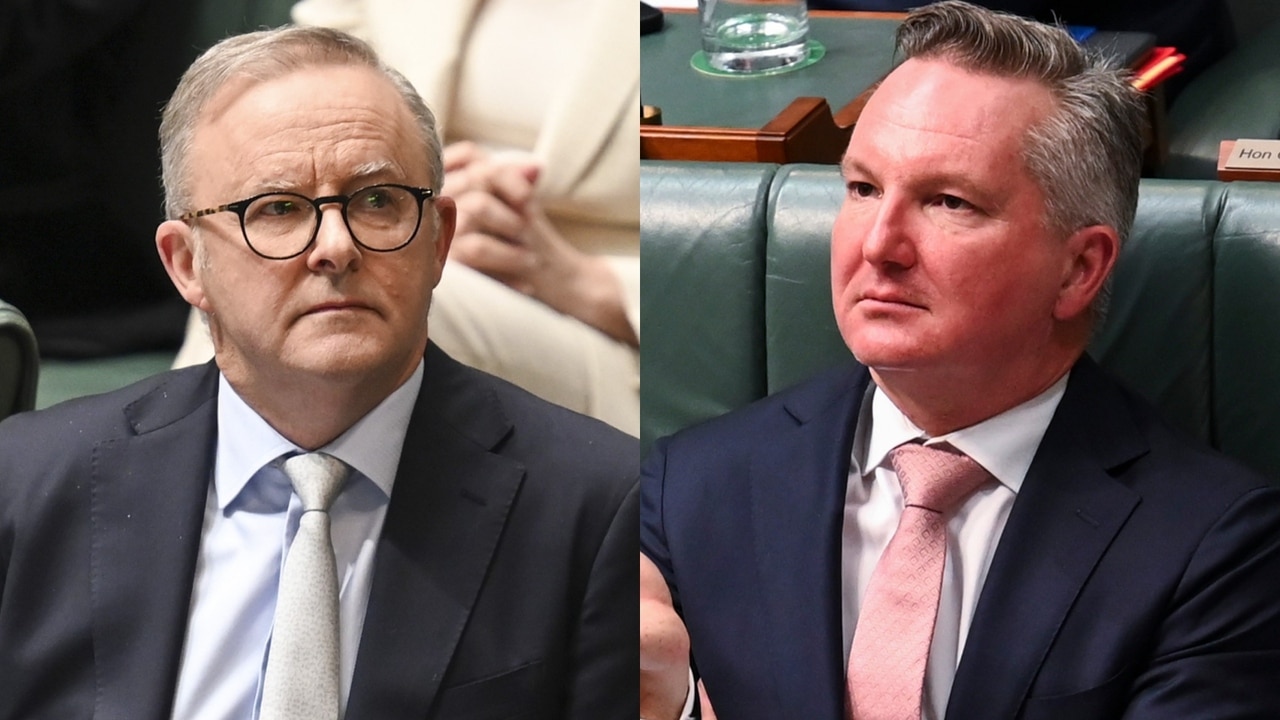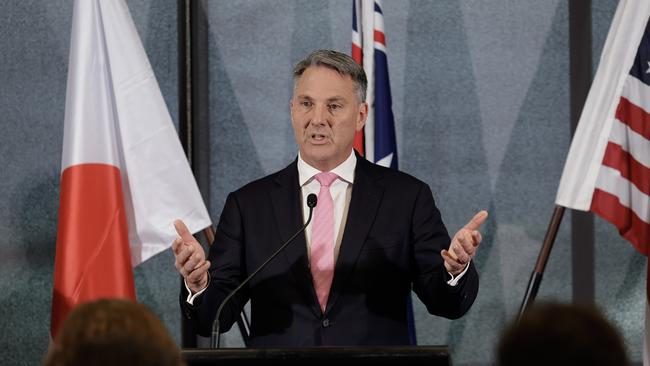Chris Bowen’s UK-US nuclear energy pact COP out leaves AUKUS partners surprised
The Albanese government has been forced to defend ‘outlawing’ nuclear energy after rejecting an invitation from its AUKUS security pact partners to join a global move to speed up the spread of civilian nuclear energy.

The Albanese government has been forced to defend “outlawing” nuclear energy and faced accusations of being an “international embarrassment” after rejecting an invitation from its AUKUS security pact partners to join a global move to speed up the spread of civilian nuclear energy.
At the COP29 climate change talks in Baku, Energy Minister Chris Bowen rebuffed an appeal from the UK and the US to sign the nuclear agreement, aimed at decarbonising industry from March next year.
The rejection was despite a British government statement that Australia was expected to join along with more than 30 other nations.
UK Energy Secretary Ed Miliband said his country was “reversing a legacy of no nuclear being delivered and moving forward with its advanced nuclear-reactor program”.
“Nuclear will play a vital role in our clean energy future. That is why we are working closely with our allies to unleash the potential of cutting-edge nuclear technology,” Mr Miliband said.
Later he altered his ministerial statement and dropped all reference to Australia when it became a political issue.

Peter Dutton said Australia had become an “international embarrassment” under Anthony Albanese’s energy policy, after the government refused to sign the Generation IV International Forum nuclear agreement with its closest allies.
Minerals Council of Australia chief executive Tania Constable said the refusal to renew membership of a key international nuclear-technology development forum was “a missed opportunity that undermines the strength of these critical partnerships”.
Mr Bowen’s rejection of the US-UK invitation occurred as Richard Marles, as Acting Prime Minister, and Jim Chalmers launched a Parliamentary attack on the Coalition’s nuclear plans describing them as risky and delivering “the most expensive form of energy in the world”.
The Opposition Leader, who is still yet to release the Coalition’s nuclear-energy costings, urged South Australian Labor Premier, Peter Malinauskas and “the adults” within the Labor Party to “stand up … and try and provide some direction for a directionless Prime Minister”.
“We know the US and the UK expected Australia to sign up to the nuclear agreement,” Mr Dutton said. “We know that at COP28 there were 31 countries that signed up to a tripling of energy derived from zero-emissions nuclear technology. Australia is starting to become an international embarrassment under Chris Bowen and Mr Albanese.
“The government has a train-wreck problem here when it comes to their energy policy and we now have Chris Bowen internationally embarrassing us with our international partners and our closest allies in the United States and the United Kingdom – both of them left-of-centre governments.”
Mr Dutton used Canadian Prime Minister Justin Trudeau’s comment that emissions targets can’t be achieved without nuclear technology, to declare Australia “can’t achieve the outcomes that we want for our economy or for the environment without nuclear power”.

When Mr Dutton asked Mr Marles in parliament whether Australia would sign up to the nuclear agreement with Australia’s allies, the Acting Prime Minister said: “I can confirm that the Australian government will not be signing that agreement. For Australia, pursuing a path of nuclear energy would represent pursuing the single most expensive electricity option on the planet.”
In the Azerbaijan captial , after rejecting the nuclear invitation, Mr Bowen said Australia was “accelerating our transformation to lock in our place as an indispensable part of the global net-zero economy to help other countries to decarbonise”.
He said the government’s approach to climate change “makes economic sense at every level from the household budget to the nation’s economy”.
Ms Constable said the refusal to talk about nuclear energy was evidence of “outdated thinking” and a continued priority “of politics over progress”. “Worse still, the government argues nuclear energy would take too long, while now actively ensuring Australia is excluded from an international forum designed to speed up development and innovation,” Ms Constrable said. “This guarantees we will fall even further behind the rest of the world.”
The UK and the US had expected Australia to sign the agreement as well as “willing parties” including Canada, France, Japan, South Korea, South Africa, China and Switzerland. But, through the statement from his office, Mr Bowen rejected the UK invitation. “Australia is not signing this agreement as we do not have a nuclear-energy industry,” it said. “Nuclear power is outlawed in Australia. We will continue to work closely with our international partners to reach net zero.
“Our international partners understand that Australia’s abundance of renewable energy resources makes nuclear power, including nuclear power through small modular reactors, not a viable option for inclusion in our energy mix for decarbonisation efforts.”
Mr Bowen also argued that Australia’s longer hours of sunshine compared with the UK meant that Australia had solar-power advantages and nuclear energy was not viable for Australia.
“Put simply, London has only 1633 hours of sunshine in an average year. By comparison, Australia’s least sunny capital city is Melbourne with 2362, while our sunniest capital city is Perth has 3229,” Mr Bowen’s statement said.
“We will remain as observers to this agreement to continue to support our scientists in other nuclear research fields,” the statement said.







To join the conversation, please log in. Don't have an account? Register
Join the conversation, you are commenting as Logout